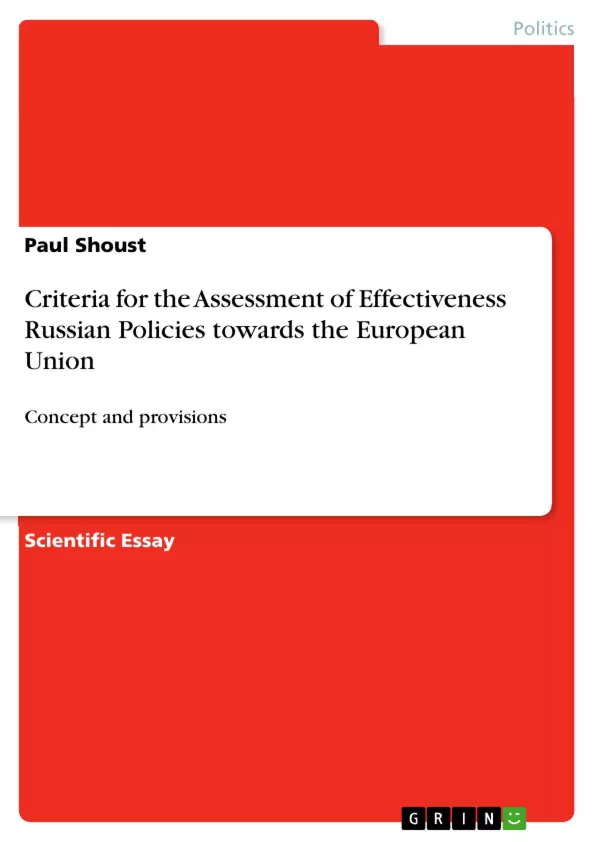The main aim of the paper is to assess how does the Russian Federation form its policies towards the European Union and how effective such policies are. The paper explores the main actors, challenges and levels of the decision-making process. The conclusions emphasize difference of effectiveness of the policy on different level of the actors’ cooperation.
Inhaltsverzeichnis (Table of Contents)
- Abstract
- Goals of Russian Policies towards the European Union
- Criteria for the Assessment of Effectiveness
- Pursuing the Goals in Practice
- Effectiveness in Foreign Policy Domain
- Evaluation of the Criteria
Zielsetzung und Themenschwerpunkte (Objectives and Key Themes)
The paper analyzes the formation and effectiveness of the Russian Federation's policies towards the European Union, exploring the key actors, challenges, and decision-making processes involved.
- Evolution and dynamics of Russian policies towards the EU
- Influence of domestic and international factors on policy formation
- Identification and analysis of key goals and strategies
- Assessment of policy effectiveness through objective and subjective criteria
- Challenges and limitations in achieving desired outcomes
Zusammenfassung der Kapitel (Chapter Summaries)
- Abstract: This section provides a brief overview of the paper's focus, which is to assess the effectiveness of Russian policies towards the European Union. It highlights the paper's exploration of the main actors, challenges, and decision-making processes involved in shaping these policies.
- Goals of Russian Policies towards the European Union: This chapter examines the evolving goals of Russian policies towards the EU, highlighting the factors from both the Russian and European sides that have contributed to these adjustments. The section discusses the impact of changes in the Russian political system, domestic economic reforms, and the European Union's enlargements on the development of Russia's approach to the EU.
- Criteria for the Assessment of Effectiveness: This chapter addresses the importance of identifying the main goals of Russian policy towards the EU in order to assess its effectiveness. It explores the ideological basis of the relationship, recognizing the aspiration for equal partnership between Russia and the EU. The chapter outlines the practical goals, including ensuring policy continuity after EU enlargements, securing bilateral investments, and achieving mutual support on key issues.
- Pursuing the Goals in Practice: This chapter delves into the practical mechanisms employed by Russia to achieve its policy goals. It discusses the coordinating role of the Russian Ministry of Foreign Affairs and the tools at its disposal, including direct cooperation with EU institutions and information support of foreign policy. The section highlights the significance of informal meetings and summits in navigating complex political realities.
- Effectiveness in Foreign Policy Domain: This chapter examines the concept of effectiveness in the foreign policy domain, highlighting the importance of considering the interplay of conflicting interests and the potential for compromise. It uses examples to illustrate how the intensity of the harmonization process can influence the level of success in pursuing initial goals.
Schlüsselwörter (Keywords)
The core themes and concepts explored in this paper include Russian foreign policy, European Union, bilateral relations, policy effectiveness, decision-making processes, strategic goals, actors, institutional framework, and regionalization.
Frequently Asked Questions
What is the main goal of Russia's policy towards the EU?
Russia aims for an "equal partnership" that ensures policy continuity, secures bilateral investments, and achieves mutual support on key international issues.
Which Russian institution coordinates policies towards the EU?
The Russian Ministry of Foreign Affairs plays the central coordinating role in managing relationships with EU institutions.
How did EU enlargement affect Russian policies?
EU enlargements forced Russia to adjust its goals to ensure that its economic and political interests were maintained in the newly expanded European territory.
What criteria are used to assess the effectiveness of these policies?
Effectiveness is assessed through objective criteria like investment security and subjective criteria like the intensity of the harmonization process and political compromise.
What role do informal summits play in Russia-EU relations?
Informal meetings and summits are crucial tools for navigating complex political realities and finding common ground outside formal institutional frameworks.
- Quote paper
- Paul Shoust (Author), 2008, Criteria for the Assessment of Effectiveness Russian Policies towards the European Union, Munich, GRIN Verlag, https://www.grin.com/document/162283



